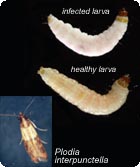séminaire du pôle évolution du vivant – vendredi 29 février 2008
 The evolutionary ecology of conflict between parasites with different transmission modes: sabotage and protection
The evolutionary ecology of conflict between parasites with different transmission modes: sabotage and protection
Mike Boots, Department of Animal and Plant Sciences, université de Sheffield, Royaume-Uni
vendredi 29 février 2008 à 11 heures, amphithéâtre Monge, bâtiment Gabriel
Ecological feedbacks are crucial to host parasite evolutionary interactions. For instance, increased resistance lowers prevalence while tolerance increases it and therefore as they evolve they alter the selection pressures that determine the outcome. Here I discuss a number of theoretical models that emphasize the importance of ecological feedbacks in host-parasite evolution. Generally hosts are attacked by multiple parasites which of course means that parasites must share their hosts. When parasites have different life-histories and in particular different transmission modes, sharing the same host may lead to important selection pressures. The implications of protection, sabotage, feminization and castration to the evolution of the two parasites are examined under the assumption of a number of trade-off assumptions. The feedbacks between the ecology/epidemiology of the interactions and the evolution of the traits leads to complex evolutionary outcomes. Protection may explain the persistence of many vertically transmitted parasites and the presence of these parasites may explain the high virulence of many horizontally transmitting parasites. The evolutionary outcome with parasites that effect fecundity is particularly interesting and emphasizes the importance of considering the sub-lethal effects of parasites.
- kc_data:
- a:8:{i:0;s:0:"";s:4:"mode";s:0:"";s:3:"css";s:0:"";s:9:"max_width";s:0:"";s:7:"classes";s:0:"";s:9:"thumbnail";s:0:"";s:9:"collapsed";s:0:"";s:9:"optimized";s:0:"";}
- kc_raw_content:
 The evolutionary ecology of conflict between parasites with different transmission modes: sabotage and protection
The evolutionary ecology of conflict between parasites with different transmission modes: sabotage and protectionMike Boots, Department of Animal and Plant Sciences, université de Sheffield, Royaume-Uni
vendredi 29 février 2008 à 11 heures, amphithéâtre Monge, bâtiment Gabriel
Ecological feedbacks are crucial to host parasite evolutionary interactions. For instance, increased resistance lowers prevalence while tolerance increases it and therefore as they evolve they alter the selection pressures that determine the outcome. Here I discuss a number of theoretical models that emphasize the importance of ecological feedbacks in host-parasite evolution. Generally hosts are attacked by multiple parasites which of course means that parasites must share their hosts. When parasites have different life-histories and in particular different transmission modes, sharing the same host may lead to important selection pressures. The implications of protection, sabotage, feminization and castration to the evolution of the two parasites are examined under the assumption of a number of trade-off assumptions. The feedbacks between the ecology/epidemiology of the interactions and the evolution of the traits leads to complex evolutionary outcomes. Protection may explain the persistence of many vertically transmitted parasites and the presence of these parasites may explain the high virulence of many horizontally transmitting parasites. The evolutionary outcome with parasites that effect fecundity is particularly interesting and emphasizes the importance of considering the sub-lethal effects of parasites.
- extrait:
- lien_externe:
- titre:
- The evolutionary ecology of conflict between parasites with different transmission modes: sabotage and protection
- intervenant:
- Mike Boots
- date:
- vendredi 29 février 2008
